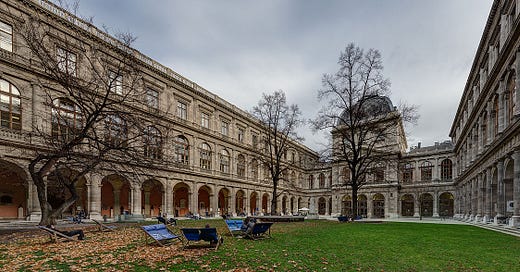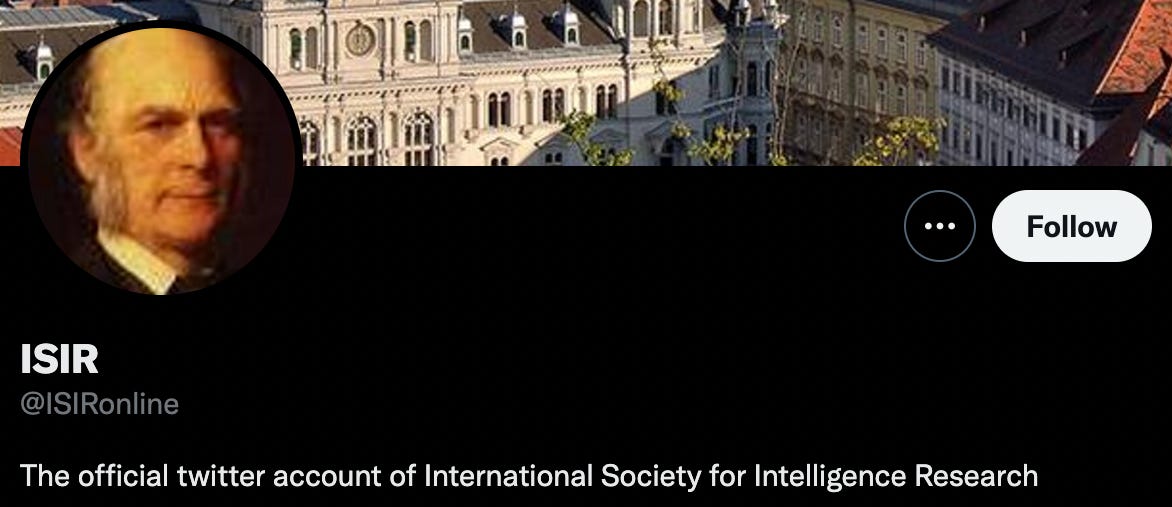The ISIR Vienna affair
Last week, a minor cancellation took place at the ISIR conference in Vienna (ISIR stands for ‘International Society for Intelligence Research’). Emil Kirkegaard, with whom many readers will be familiar, was due to present a paper titled ‘Neuroscience of intelligence in the ABCD study’. His paper had been submitted in advance and accepted by the conference organisers.
However, ten days before the conference was due to start, Abdel Abdellaoui (the keynote speaker) announced on Twitter that he was boycotting the conference in protest at Kirkegaard’s participation. He claimed not only that Kirkegaard is “racist”, but that he lacks the “credentials of a bona fide scholar” and that his scientific work is “subpar”. No specific evidence was provided for these assertions.
Although the relevant tweet did not exactly go “viral”, it generated a fair amount of attention, having been signal-boosted by Adam Rutherford. Several other complaints apparently followed, including a student petition at the University of Vienna – where the conference was due to be held. These complaints prompted the conference organisers to cancel Kirkegaard’s talk. The keynote speaker then announced that he would be speaking after all.
One might hypothesise that the conference organisers were told to cancel Kirkegaard’s talk by administrators at the University of Vienna, who would otherwise have cancelled the entire conference – owing to student opposition.
I did not attend the conference. However, I am told that the keynote speaker’s talk was not well-received by all of those present. This was not because of the talk’s scientific content – Abdellaoui happens to be an excellent researcher – but because of extra “political” content. (Though he disputes this.) I am also told that many attendees privately expressed their opposition to the keynote speaker’s behaviour.
In addition, an individual sympathetic to Kirkegaard booked a room at a nearby hotel, where Kirkegaard was able to give his talk to a group of around twenty people – including some senior academics and members of ISIR.
What should we make of all this? As to the conference organisers, their decision to cancel Kirkegaard’s talk after it had already been accepted is highly improper. And it’s rather ironic coming from ISIR, an organisation that uses a picture of Sir Francis Galton on Twitter. Galton, one of the founding fathers of intelligence research, was posthumously cancelled at UCL on the grounds that he was “racist” and supported eugenics.
What’s more, ISIR bestowed lifetime achievement awards on Arthur Jensen and Linda Gottfredson – who have both been denounced as “racist”. And in 2009, they invited Charles Murray – who has also been denounced as “racist” – to give a distinguished contributor interview. Note: I’m not saying any of these individuals are racist, only that (like Kirkegaard) they’ve been accused of racism.
On the other hand, if the conference organisers were told something to the effect that “we will not host your conference unless you cancel this talk” by administrators at the University of Vienna, their decision is perhaps understandable. After all, it would have been impossible to find another venue at such short notice, and attendees might not have been able to get refunds for their plane tickets.
Regarding the keynote speaker, his behaviour too is highly improper. Of course, he is free to boycott any conference he wishes, but he must have known that by announcing his decision on Twitter he was likely to incite further complaints, thereby heaping pressure on the conference organisers and putting them in a difficult position. A more honourable way of conducting himself would have been to express his protest through private channels.
Having said that, boycotting a conference because you object to the views or conduct of one of the speakers is inconsistent with Mertonian norms of science. In 1942, Robert K. Merton identified four norms for ideal scientific practice: communalism; universalism; disinterestedness; and organised skepticism. Universalism stipulates that scientists be judged on impersonal criteria. “To restrict scientific careers on grounds other than lack of competence,” Merton notes, “is to prejudice the furtherance of knowledge.”
So even if Kirkegaard were “racist”, from the perspective of ideal scientific practice that would not be a valid reason to “restrict his career”. Kirkegaard has penned a blog post outlining his political views in detail, so readers can decide for themselves whether the allegation against him is fair.
What about “lack of competence”? The keynote speaker claimed that Kirkegaard lacks the “credentials of a bona fide scholar” and that his scientific work is “subpar”. He reiterated these claims in a follow-up article.
Objecting to Kirkegaard’s presence on the grounds that he lacks the “credentials of a bona fide scholar” (meaning a PhD) is pure credentialism and can be safely dismissed. Anyone may contribute to science, regardless of what qualifications they have. It is mere historical accident that in Western countries at the present time, getting a job in academia requires a PhD.
As to whether Kirkegaard’s scientific work is “subpar”, no supporting evidence was provided. While some of his papers have been subject to criticism, this is true of many scientists and is hardly disqualifying. Kirkegaard’s talk had already been accepted by the conference organisers, who are intelligence researchers themselves. And he has published at least six papers in relevant journals: four in Intelligence, one in Journal of Intelligence, and one in Journal of Individual Differences.
A final point worth noting is that the keynote speaker has been attacked by activists himself. And it seems reasonable to assume he did not appreciate this. Which raises the question of why he felt justified in doing the same thing to someone else.
The “ISIR Vienna affair” is far from the worst incident of academic cancel culture. But it does exemplify a number of regrettable trends from recent years, such as scholars refusing to “co-platform” those they consider “bad”, and institutions reversing course under pressure from activists. ISIR is one of the few non-woke organisations left in academia and I sincerely hope it stays that way.
Image: Arkadenhof in the University of Vienna, 2015
Thanks for reading. If you found this newsletter useful, please share it with your friends. And please consider subscribing if you haven’t done so already.






